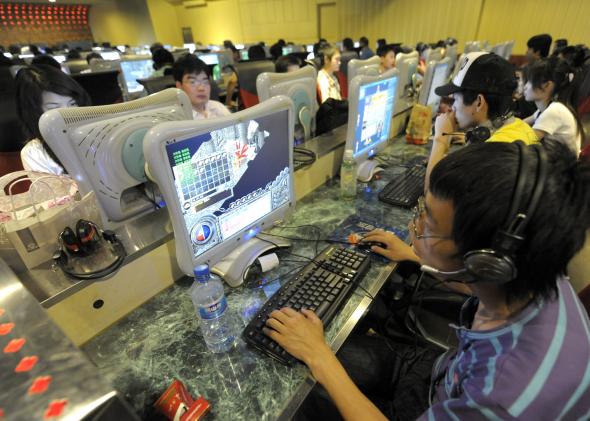Netizen Report: China Teases Users With Intermittent Censorship

Photo by LIU JIN/AFP/Getty Images
The Netizen Report originally appears each week on Global Voices Advocacy. Renata Avila, Hae-in Lim, Lisa Ferguson, Ellery Roberts Biddle, and Sarah Myers West contributed to this report.
Global Voices Advocacy's Netizen Report offers an international snapshot of challenges, victories, and emerging trends in Internet rights around the world. This week's report begins in China, where the information crackdown spawned by the 25th anniversary of the Tiananmen Square massacre continues to play out online. It feels as if authorities are attempting to tease users, as they take an unusually erratic approach to Internet censorship across the country.
In the run-up to the anniversary in early June, several Google services—including Google.com, Google Translate, and Gmail—were blocked in mainland China. Last week, they became accessible for Chinese users for several hours but were then blocked again.
New research published last week by Citizen Lab indicated that chat apps KakaoTalk and LINE, along with OneDrive and Flickr, also have been unavailable in some parts of the country, while Instagram has been removed from China’s Android app stores. It remains searchable on Apple’s iOS app store and via browsers, for now.
Surveillance: Lawyers, geeks, and librarians all say no to censorship in Turkey
In Turkey, local NGOs alleged that Turk Telekom, the country’s leading telecommunications service provider, purchased equipment for monitoring social media and blocking websites. A group of civil society organizations—including the Association of Librarians, the Ankara Bar Association, and even the local Pirate Party—published a joint declaration [link in Turkish] calling the move a violation of freedoms guaranteed by the nation’s Constitution.
Syria experienced its first total Internet outage since May 2013 on Saturday, July 12, with reports that the Internet was down for the entire country for about two hours. Aleppo and the north of Syria remained without Internet until Monday morning, according to the Internet traffic monitoring group Renesys. Experts speculated that the outage was an effort to combat ISIS, which uses social media to spread its message.
Thuggery: 8-21 years in prison for Iranian Facebook users
Iran’s state news agency reported Sunday that eight Facebook group administrators have been prosecuted and sentenced to between eight and 21 years in prison for allegedly “colluding and gathering against national security, propaganda activities against the system, insulting sacred symbols, insulting the judiciary and insulting specific individuals.” Little more is known about the case.
Global Voices author and University of Toronto Ph.D. student Alexander Sodiqov has been in prison in Tajikistan for more than a month. Learn more about his case and advocacy efforts to call for his release here.
Copyright: Bitter end for torrenting in Singapore?
At the end of August, Singapore will start blocking access to websites that can be used to share copyrighted material. New amendments to the country’s copyright law will allow content owners to obtain judicial orders requiring Internet service providers to block sites like the Pirate Bay. Currently, copyright holders can send a notice to ISPs asking them to disable access to their content, but ISP compliance is not required by law. This policy shift deals a heavy blow to file-sharing geeks in Singapore, currently a world leader in BitTorrent traffic.
Industry: Philippine politician tells ISPs, “Speed it up or pay up!”
Philippine House Deputy Minority Leader Arnel Ty is seeking to update the nation’s telecommunications law by increasing the maximum fine charged to Internet service providers for delivering subpar Internet speeds from a daily fine of 200 pesos to up to 50 million pesos (roughly USD $1.1 million). Under the amended law, high-speed Internet access would be considered a “basic service” like voice and text. Ty previously filed a resolution calling for an inquiry into telecommunication companies’ deteriorating services in the Philippines. At an average of 3.6 Mbps, the Philippines has the slowest Internet of any country in the Association of Southeast Asian Nations. The average for Southeast Asia is 12.4 Mbps.
Google plans to reverse its "real name" policy—users will now be allowed to use any name they wish, across Google services. Since it was introduced in 2011, the controversial policy triggered fiery debates about online anonymity and privacy that touched many core digital rights issues that feel ever-more present in the post-Snowden era. Writing for ZDnet, Violet Blue offers a short history of the "Nymwars" and some reflection on what this may mean for Google's relationship with users.
Netizen Activism: Birthday parties and hackathons for the open Web
The Web We Want campaign announced its Web 25 Year of Action mini-grants, awarding proposals for a “birthday party” event or action to get participants involved in imagining the Web they want. Among the proposals are a crypto-rally hosted by Mexican hackerspace Rancho Electronico, a bus trip across the Netherlands hosted by Privacy Cafe, and a “Hamara Internet” campaign launched by the Digital Rights Foundation (Pakistan) that is reaching out to women in rural Pakistan to teach them the importance of smart use of the Web and protection of privacy.
New Research
- “Internet Monitor’s New Data Platform”—Berkman Center for Internet & Society
- “Information Controls During Thailand’s 2014 Coup”—Citizen Lab
- “World Trends in Freedom of Expression and Media Development”—UNESCO
Future Tense is a partnership of Slate, New America, and Arizona State University.

